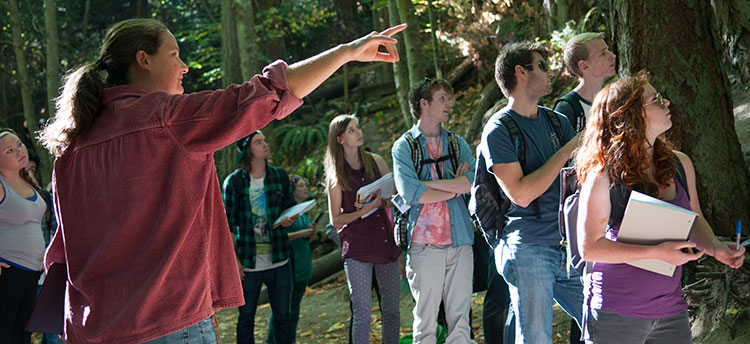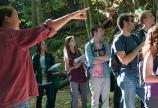UVic gets top marks for sustainability in Princeton Review's annual Guide to Green Colleges

The University of Victoria was given a perfect score in the 2015 edition of The Princeton Review’s Guide to 353 Green Colleges, an annual publication spotlighting campuses in the US and Canada with exceptional commitment to sustainability in their policies, initiatives and academic programs.
The scoring is a comprehensive measure of how environmentally responsible a school's policies are, and how well a school is preparing students for employment in the clean-energy economy of the 21st century as well as for citizenship in a world now defined by environmental concerns and opportunities.
The Princeton Review chose the colleges based on "Green Rating" scores (from 60 to 99) that the company tallied in summer 2014 for 861 colleges using data from its 2013-14 survey of school administrators.
Last year, Princeton Review used that data to unveil a shortlist of 24 schools in North America who had achieved a “perfect” score of 99. UVic was the only Canadian school to make that list.
This spring’s guide is made up of a larger set of schools with green ratings of 83 or above, and provides more information on each of the schools. The four other Canadian universities are: Calgary (97), Western University (91), the University of British Columbia (90) and the University of Windsor (83).
"We have a long history of leadership in sustainability at UVic,” says Gayle Gorrill, vice president of finance and operations. “Many of our campus policies and practices started with ideas and actions from individual faculty, staff and students. This individual commitment speaks volumes about the kind of campus community we have here. It’s an inspiring place to work and study."
UVic is noted for its focus on local and regionally sustainable practices: roughly 50 per cent of its food budget is spent on locally grown food; roughly 72 per cent of all food waste is composted; 75 per cent of all new plants installed on campus are native; all toxic chemicals are being eliminated from its routine landscape management; and selected areas of the campus are being “naturalized,” reducing irrigation and saving resources—8,500 cubic meters of water and $17,000 annually.
The UVic Freestore is an example of collaboration between the UVSS, the Waste Reduction department, and Campus Planning and Sustainability and has helped solidify our spot as a leader in waste reduction among post secondary institutions. It opened its doors in September 2014 and facilitates the reuse of items that would otherwise need to be landfilled or recycled. UVic’s “waste diversion” rate, which is a measure of how much we recycle rather than send to landfill, is roughly 69 per cent. Most other institutions are at between 40 and 50 per cent.
CARSA utilizes a ground-source—or geo-thermal—heating system that is ultra-efficient and as a result has cut the estimated emission of the building by almost 350 Tonnes of CO2e/year. This is estimated to save the UVic about $100,000 per year in operating costs and over $16,000 per year in carbon-related costs.
Academically, UVic rated highly for its multiple sustainability-focused degree programs including in the Department of Environmental Studies, which started its first PhD stream in 2014. Sustainable curricula and research can be found across the entire university, including a high density of clean energy researchers in mechanical engineering, in part to the interdisciplinary research success of the Integrated Energy Systems research centre (IESVic).
View UVic’s Sustainability action plan 2014-2019 (pdf)

